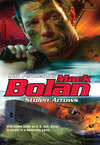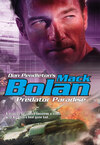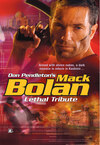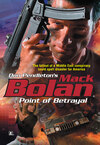Kitabı oku: «Survival Reflex», sayfa 2
Blancanales shook his head. “Not soon enough. I’m stealing time as it is from a job in Baja.”
“Have you talked to Hal?”
“He isn’t thrilled about it, but he says it’s up to us. Resources as available, but no hands-on collaboration till we’ve got a clear fix on the problem.”
Bolan’s smile took Blancanales by surprise. “‘We’ meaning me,” he said.
“If you decide to do it, right.”
“And is the woman still around? This Marta?”
“Waiting for a verdict as we speak.”
“Not here?”
“Nearby. The way it seems to me, she’s used to hiding out.”
“When can we talk?”
Blancanales felt himself start to relax inside. “How do you feel about right now?” he asked.
THEY TRAVELED separately, Bolan trailing his old friend to form a little two-car caravan that traveled half a dozen blocks on Harbor Drive, then swung inland. Blancanales led him to the spacious parking lot of a motel located near the U.S. naval station, then drove around the back with Bolan following, and parked close to the open stairs. The Executioner said nothing as he trailed his friend upstairs and left along a balcony to Room 252.
“I called ahead,” the Able Team commando told him, “so we wouldn’t spook her.”
Blancanales knocked and waited while the tenant of that room surveyed them through the peephole’s fish-eye lens. There came a fumbling at the locks, and then the door swung open to admit them. Only when they were inside, door locked again, did Bolan have a clear view of the woman he had come to meet.
Marta Enriquez was approximately thirty-five years old, a slim Latina with a curvaceous figure. A pinched look almost spoiled the face, framed by a fall of raven hair, but large, dark eyes and high cheekbones redeemed it.
Blancanales made the introductions, using Bolan’s relatively new Matt Cooper pseudonym, and the woman surprised him with the strength of her handshake.
“If we could all sit down,” Blancanales said, “this won’t take long.” He settled on one corner of the queen-size bed, leaving the room’s two chairs for Bolan and their nervous hostess. “Marta, why don’t you tell my friend what brings you here.”
“I want to help O Médico,” she said. “He has done so much for my people in the past three years, I must somehow repay him if I can. The danger that he faces now is too much.”
“What kind of danger?” Bolan asked her.
“From the army and the death squads,” she replied. “I know your press tells you Brazil is free and all are equal there, but things aren’t what they seem. My people—the Tehuelche—have been driven from their homes and deep into the forest, where the hunters seek them still. They are shot on sight. Sometimes a ‘gift’ of food or clothing is delivered, and more of us die.”
“It’s classic,” Blancanales interjected. “Your manifest-destiny types did the same thing right here, with poisoned grain and blankets spiked with smallpox. Talk about weapons of mass destruction.”
“O Médico—Dr. Weiss—has helped us without charge since he arrived. He offers care to anyone in need, and for that crime, the state will kill him, or at least expel him from Brazil.”
“You’ve witnessed these attempts?” Bolan asked.
Enriquez nodded. “Once, when we went to Diamantino for supplies, three men approached us. They insulted me, touched me and Dr. Weiss told them to stop. They turned on him then, but he left all three of them unconscious in the street.
“Later,” she continued, “they sent helicopters to the village of my people, shooting from the sky. O Médico treated the wounded, even while bullets flew around him.”
“I don’t know what you’re asking us to do,” Bolan told her. “If the government wants to get rid of him, they’ll find a way to do the job. We can’t declare war on Brazil.”
“Nathan told me that he had friends of great ability in the United States. He sent me here to ask for help, but I am not a fool. I know he cannot stay and help my people any longer without giving up his life.”
“What, then?”
“You must persuade him to give up, go home, before he’s killed. Take him by force, if necessary. Be his friend and save his life.”
“Just drop into the jungle there and kidnap him.”
“Maybe he’ll listen if you talk to him,” she said. “Remind him that he is American and not Tehuelche.”
“Couldn’t you do that?” Bolan asked.
“To my people, Nathan—Dr. Weiss—is almost like a god. They need him to survive and love him for the help he offers them, but they think first about themselves. Sometimes, it seems as if they think he is immortal and cannot be harmed by common men.”
Bolan had picked up on her use of Weiss’s given name and wondered whether there was something more between them than a simple doctor-patient relationship. Despite the time they’d spent together under fire, some jungle R and R between engagements, Bolan didn’t know the details of his old friend’s private life, his taste in women, anything along those lines. He knew the man’s determination, though, and the soldier didn’t like the odds of him persuading Bones to leave his self-appointed mission.
“You say he’s being hunted just because he helped your people?” Bolan asked.
“It’s one reason,” the woman answered, “but the government has ample cause to hate him. Before us, he was in Rio de Janeiro. There, he had a clinic for street children. Did you know that some policemen, after hours, drive around the streets and shoot the homeless children as if they were rabid dogs?”
“I’ve heard the stories,” Bolan said.
“They’re true, and sometimes worse than what you read in newspapers or magazines. After six months in Rio, the police got an injunction to prevent Nathan from treating children without the consent of their parents. Orphans! You see? When he continued, they put him in jail. Before he was released, they burned his clinic and declared the fire an accident.”
“So he moved on?”
“To spare the children, after a police lieutenant told him every one he treated would be thrown in prison to amuse the perverts. It hurt him, but he left to find new patients.”
“It’s a jump from Rio to the Mato Grosso jungle,” Bolan said.
“He tried some other places first. AIDS patients in São Paulo. Plantation laborers at Uberlândia. Guarani Indians in the Serra Dourada. Each time it was the same. Suspicion, threats against his life and those he tried to help.”
“It’s obvious he isn’t listening,” Bolan replied. “What makes you think that he’ll hear anything I have to say?”
“Because he asked for you, his friends.”
“Unless you’re holding back, he didn’t ask us to come down and snatch him out of there.”
“Perhaps he’ll listen. But if not, when it is done, at least he will be safe.”
“What’s to prevent him turning right around and going back?” Bolan asked. “We can’t lock him up and throw away the key.”
“Perhaps, when he has time to think in peace, he’ll realize that nothing can be gained by what he’s doing in my country.”
“What about your people?” Blancanales inquired.
Stone-faced, she said, “We’re finished, don’t you see? Nathan can’t save us. No one can. He’ll only waste his life, when he could be of such great help to others, somewhere else.”
“Would you be coming with him?” Bolan asked.
“I don’t know,” she replied. “Perhaps, if Nathan wants me.”
“When are you going back?”
“Tomorrow. One way or another, I must give him your decision.”
“I’ll tell him myself.” Turning to Blancanales, he said, “We need a minute to ourselves.”
THE MOTEL BALCONY was adequate, no one in the adjoining rooms to eavesdrop as they leaned against the rail in hazy Southern California sunshine.
“Now I’ve heard her,” Bolan said, “give me your take on this.”
“I think Bones may be losing it. Looking for a cause, some way to make his life count for something. Hell, for all I know it could be your basic midlife crisis.”
“Maybe. But who’s picking up the tab? Free clinics may be free to patients, but they eat up money just the same, and plenty of it.”
“I can answer part of that,” Blancanales said. “I ran a check on Bones through Stony Man. He had some money from his family, back East. Not Rockefeller money, but they did all right. He’s the last of the line, never married, no siblings. Had a good adviser, made some smart investments. Most of it was liquidated when he left the States. Call it a cool half million, give or take.”
“That’s seed money,” Bolan replied. “A big seed, sure, but he’s been working with the lady’s tribe for three years now, no charge, and all the other deals she talked about before he focused in on them. The Rio clinic and what-have-you. Would half a million last that long, paying for medicine, equipment and facilities, travel?”
“I doubt it.”
“So, I’ll ask again. Who’s picking up the tab?”
Blancanales shook his head. “Don’t know.”
“One thing we do know,” Bolan said. “If Bones has his mind set on helping these people, he won’t be talked out of it.”
“No.”
“And I don’t fancy trying to carry him out of Brazil on my back, bound and gagged.”
“Why are you going, then?”
“First thing, to have a look and see what’s really happening.” He nodded toward the door numbered 252. “I think we’ve got a case of hero-worship here, or maybe love. I don’t believe she’s told us everything she knows about what Bones is doing in the big, bad woods.”
“You figure it’s political?”
“She talks about a man who’s looking for a cause. Maybe he wants to be a martyr. I won’t know until I see it for myself.”
“Wish I could back you up,” Blancanales said.
“I’m just observing,” Bolan told him.
“Rii-iight. And I’m the next Olympic figure-skating champion.”
“I’ll need a flight. One way for now,” Bolan said. “Find out where she’s touching down and send me somewhere else. I’ll catch a shuttle to the airstrip nearest Bones. Don’t tell her when I’m flying.”
Blancanales frowned. “You figure she’s a sell-out?”
“Why take chances? If she’s straight, there’s still at least a fifty-fifty chance she’ll be picked up when she gets home. If someone sweats her, I don’t want her spilling my itinerary.”
“Right,” Blancanales said. And then again, “You’re right.”
“I’ll need a contact on the other end for various supplies, including hardware. Play it safe and don’t use anyone connected to the Company or NSA.”
“I know an independent dealer in Belém.”
“That’s fine, if I can get a charter flight from there to Mato Grosso with no questions asked.”
“I’ll check it out today,” the Able Team commando promised. “If it doesn’t work, your best bet for a touchdown where you want to go will be Cuiabá. I’ll find somebody there.”
“Before you cut her loose,” Bolan said, “get the best fix that you can on where Bones has his chop shop. If he’s mobile, try for base coordinates, at least. I’ll GPS it and go solo in the bush.”
“That’s risky, man.”
“Hiring a guide is worse. I won’t know who he’s really working for until it hits the fan.”
“You’re right again. Has anybody ever told you that’s an irritating habit?”
Bolan smiled. “My childhood aspiration was to be a know-it-all.”
“And how’s that working for you?”
“I’m still working on it.”
Blancanales went somber, then. “I’m having second thoughts about this whole damn thing,” he said.
“It’s Bones,” Bolan reminded him.
“I know that, but you’ve got me thinking now. Suppose someone’s already bagged him, squeezed him. Now they’re putting out feelers to see who’ll try a rescue mission. Pick off Santa’s little helpers one by one.”
“It doesn’t have that feel about it,” Bolan said. “Somebody wants to take out Bones for helping Indians, whatever, why would they go fishing in the States?”
“Because they can?”
“It’s thin,” Bolan said, “but I’ll keep an eye peeled, just in case.”
“It may be too late, once you’re down there.”
“Maybe not. Let’s see what happens.”
“The more I think about it,” Blancanales said, “the more I wish I hadn’t called you.”
“Spilled milk, guy. Just make those calls and let me have the word before you head back down to Baja.”
“It’ll be a couple hours, give or take.”
“You’ve got my number.”
“That’s affirmative. Where will you be?”
“Around.”
“Okay. I’ll be in touch.”
Blancanales lingered on the balcony as Bolan went downstairs. No one was lurking near the rented Chevy, no one peering from the nearby rooms. Behind the wheel, the soldier took time to stop and think about the mission he’d accepted and what it would mean to follow through.
A friend in trouble, right.
But he could only help the willing.
And if Nathan Weiss had asked for help, that made him willing, on the surface. But what kind of help was Weiss expecting?
Extrication or combat support?
Bolan had no illusions concerning his ability to make a one-man stand against the whole Brazilian army, even if a friend’s life might be riding on the line. Weiss might be looking for a martyr’s end, but that would never be a part of Bolan’s plan.
Die fighting if he had to, absolutely.
But to throw his life away?
Forget about it.
He would have a look, as promised, and take it from there. The next step would be up to Bones.
And Bolan hoped the bones he left behind him in the jungle wouldn’t be his own.
CHAPTER THREE
Belém, Brazil
The first leg of Bolan’s long journey was a two-hour flight from San Diego to Mexico City, with ninety minutes in the airport terminal, waiting to make his connection. He stayed alert from force of habit, even though no one he could think of had any reason to be hunting him in Mexico.
His enemies in that troubled country were all either dead or in prison, as far as he knew, but it never hurt to be careful. He bought an English-language guidebook for Brazil and started reading it at the departure gate, killing time.
The authors considered Brazil a Latin miracle of sorts, emerging from military rule to reclaim civilian democracy in the mid-1980s, battling back from a decade of economic crises to stand head and shoulders above its neighbors, national triumph symbolized by five straight victories in World Cup soccer finals. There was only passing mention of the country’s long-time military junta and its brutal violence, countered by rebel insurrection in the cities and the hinterlands. No mention at all of homeless children hunted through the streets by death squads or the covert policy of “relocating” native tribes at any cost.
Bolan wasn’t surprised by the guidebook’s omissions. Tourist economies thrived on illusion, whether it was Carnivale in Rio, Atlantic City’s neon boardwalk or the Las Vegas Strip. No advertising agent pointed out his client’s warts or called attention to the smell of rot that wafted from behind most glittering facades.
In Bolan’s personal experience, there was no government on Earth without a dark core of corruption at its heart. No tourist paradise without a nest of vipers in the garden or a school of sharks cruising offshore. No end of problems for a die-hard altruist to tackle in the autumn of his life.
But why in hell had Nathan Weiss chosen Brazil?
He was a doctor, and more specifically, a trauma surgeon. Weiss would find trauma to spare in Brazil, but the same could readily be said for New York City, San Francisco, London or Madrid. Unless Shangri-la had been discovered since the last time Bolan watched CNN, there was no shortage of victims anywhere on Earth.
So, why Brazil?
It wasn’t for the love of jungle climates. Bolan knew that much from time he’d spent with Weiss in another green hell, on the far side of the world. Bones didn’t often complain, but mosquitoes and tropical germs were among his pet peeves in those days.
Why seek them out, then, when he could’ve written his own ticket at any stateside hospital and most of those in Europe?
Pol Blancanales had been clueless on that score, nothing in Weiss’s file from Stony Man to clarify the mystery. Bolan was still puzzling over the problem when they called his flight, and during the four-hour transit to Belém. He skipped the in-flight movie, browsed his guidebook, ate the packaged pseudo-food they set in front of him, but still the question nagged him.
Why Brazil?
Whatever the reason, Bones had gotten in too deep, and now he needed help. He’d reached out for The Politician because Blancanales was traceable. If Weiss thought of Bolan at all, these days, he would presumably accept the media reports describing Bolan’s fiery death in New York City. Surgery had altered Bolan’s face more than once, made him unrecognizable if he had passed Weiss on the street.
And would he recognize the doctor, after all that time? Would he want to see what Bones had become?
And what was that, exactly?
Being hunted by the government proved nothing, either way. One man’s criminal or terrorist was another man’s heroic freedom fighter. Bolan himself had once graced every Top Ten list of fugitives in North America and western Europe, and he’d been guilty as sin in the eyes of the law, convicted by his own admission on multiple counts of murder, arson, kidnapping and sundry other felonies.
Being a fugitive meant different things, in different times and places. Ditto criminal indictment and conviction. On the basis of the sketchy data in hand, Bolan couldn’t tell if Nathan Weiss was being hunted for crimes against humanity or for helping the underdogs survive.
All he had, at the moment, were his memories of Bones and an ingrained sense of duty to a friend who’d never let him down. As to where that led him, and to what result, the next few days would tell the tale.
Bolan had a twelve-hour wait for his charter flight to Cuiabá, in Mato Grosso State, departing at six o’clock the next morning. There’d been no way to speed it up, but Blancanales had supplied him with the name of certain hardware dealers in Belém and the assurance that a private flight within Brazil involved no baggage checks. As soon as he was settled into his hotel, Bolan would take his rented car and embark on brief shopping tour to prepare for his time in the bush.
Still hoping for the best, and bracing for the worst.
BLAINE DOWNEY COULD’VE braced his target at the airport, but he thought it lacked a certain style. There was a piss-off factor, too. If he got in the stranger’s face and spooked him into turning around and leaving Brazil on the next available flight, it would minimize the meddler’s inconvenience. On balance, Downey preferred to let him rent a car, check into his hotel, and then realize it had all been a huge waste of time.
One thing, though. Looking at the man who matched the photo faxed from San Diego, Downey didn’t think he was the kind who frightened easily.
Of course, he could be wrong.
It wouldn’t be the first time, as his supervisor frequently reminded him.
The photos hadn’t told him much. A team in San Diego had observed the woman, snapped as many pictures as they could of anyone she’d spoken to in the city. There’d been waitresses, two cab drivers, a motel maid—and two men who had called upon her in her room. One showed up twice, the second time with company. Nice head shots for the pair of them, and Downey wondered now if someone should’ve used a rifle instead of a Nikon’s zoom lens.
The two-timer had been identified, after some effort, as a private investigator and security specialist named Rosario Blancanales. He was a Special Forces veteran whose service history included black ops in the Badlands. These days, as far as Langley could determine, he was more or less retired, letting his sister run the business he’d built from the ground up after his discharge. The handful of customers identified so far, including Uncle Sam, pronounced themselves entirely satisfied with the performance of Team Able Investigations.
So, the woman wanted help—and who could blame her?
Why she’d look for it in Southern California, and specifically with Blancanales, was a riddle Downey longed to solve, but it eluded him. Right now, he had a problem closer to home.
Number two. The new arrival.
The guy took a good photo, but his mug shot wasn’t stored in any high-tech archive the Agency had thus far been able to tap. The car he’d used in San Diego led them to the rental agency, where Downey’s counterparts had obtained a second-generation photocopy of the guy’s Virginia driver’s license. The license, in turn, gave them Matthew Cooper’s birth date, social security number and last-known address.
Which, in turn, led them nowhere.
The birth date might be accurate, for all Downey knew, but he couldn’t confirm it from any known source. The target’s address was a mail drop in Richmond, and his social security number—while technically active—revealed no activity of any kind since it was generated two years earlier.
Which made him…what? A criminal? A spook?
If he was in the cloak-and-dagger trade, who paid his salary? Not Langley, Downey was assured by his superiors. The Agency had worked against itself from time to time, the old right-versus-left-hand syndrome, but he’d been promised that no such snafu was in progress this day.
And that, unfortunately, didn’t reassure him in the least.
Who stood to profit if his operation in Brazil went belly up? Downey couldn’t have guessed with anything approaching certainty, so he declined to play the game. Sometimes he had to treat the symptoms, put out brush fires as they sprang to life, and let someone else track the roots of the problem.
Downey couldn’t be everywhere at once, and right now his target was standing in line at a car-rental desk on the airport concourse. He might’ve been a businessman whose flight to Belém was pure coincidence, unrelated to his meeting with the woman the previous day.
But Downey didn’t think so.
Not a chance in hell.
That’s why he watched and waited, trailed the guy until he found his car, then swiftly doubled back to meet his driver waiting at the curb, parked at the red curb with a traffic cop fuming and glaring at the diplomatic license plate.
That’s why he trailed the mark to a hotel downtown and went inside to meet the stranger, one-on-one. A little face time, just to break the ice and see what Matt Cooper was made of.
It was easier that way, than bringing in a crew and taking him apart.
UNPACKING WAS a waste of time, so Bolan didn’t bother. He changed shirts, pocketed a knife he carried in his check-through luggage and decided not to bother shaving. Halfway to the door, he heard the unexpected rapping and went on to use the peephole, checking out his uninvited visitor.
The man stood three or four inches below six feet, looking burly or just overweight in his suit. The lens made it difficult to judge, but at least his hands were empty and he was alone.
Bolan opened the door and stood waiting, silent.
“Mr. Cooper?”
Bolan didn’t answer, didn’t step aside. “Who are you?” he demanded.
“Downey,” the stranger said, thrusting out a hand, which was ignored. “Blaine Downey, from the U.S. Embassy.”
Bolan knew what that meant. He simply didn’t know, yet, if the man was CIA, NSA or attached to some other intelligence service that made up the Washington-Pentagon alphabet soup.
The bad news was, they had him marked.
But how deep did it go?
“What do you want?” he asked.
“A minute of your time, that’s all. May I come in?”
Bolan considered making him explain his business in the hallway, but security took precedence. His cover might be blown, but that was still a long way from announcing his mission to every guest on the hotel’s fifth floor.
“Five minutes,” Bolan said, “is all I have to spare.”
“Suits me,” Downey said, brushing past him in a beeline for the small room’s single chair. He sat, leaving Bolan to pick a corner of the bed or stand.
He stood.
“My hope, in a nutshell,” said Downey, “is to save you from a world of hurt.”
“How’s that?”
“You’re in Brazil on business that is bound to turn out badly,” Downey said.
“Which is?”
“Marta Enriquez. She’s a subject of some interest to the U.S. government, as well as to authorities here in Brazil. You met her yesterday, in San Diego. Now you’re here. I don’t believe in that kind of coincidence.”
“Nobody asked you,” Bolan said.
“That’s right. Nobody did. Sometimes, unfortunately, there are situations where you have to deal with consequences, even if you’d rather not. Catching my drift?”
“Not even close,” the Executioner replied.
“I’ll spell it out, then. Whatever Marta Enriquez and Mr. Rosario Blancanales may have told you in Dago, whatever they asked you to do, whatever they offered in return—you don’t want to go there.”
Denial seemed pointless. Confession, while possibly good for the soul, was unthinkable.
Time to stall.
“Because…?”
“Because I say so, Mr. Cooper. And because I represent the U.S. government.”
“We’re not in the United States.”
“You weren’t born yesterday,” Downey replied. “In fact, according to your social security records, you’re almost two years old. Happy birthday, Mr. Cooper.”
Bolan had decades of practice at keeping surprise off his face. Instead, he smiled and asked, “You’re IRS?”
“Heaven forbid! I couldn’t care less what you do with your hard-earned money, friend. Declare it, don’t declare it. All the same to me. But if you travel any further down this particular road, you’ll be stepping on some very tender toes.”
“You’ve got sore feet? Try Dr. Scholl’s.”
Downey put on a deprecating smile. “I’m just the messenger. You get one warning, friend.”
“What happens next?”
“I don’t believe you want to know.”
“No hints?”
“Let’s say you won’t enjoy it.”
“I should turn around and go back home, you’re saying.”
“To the Richmond mail drop, or wherever home may be.”
Showing his hand like that, Downey had to think he had it covered. Bolan, on the other hand, wasn’t convinced.
Not yet.
“I’ll think about it.”
Downey rose, rubbing his hands together like a miser in a high school play. “That’s all we ask,” he said, mock-cheerful. “Somber thought about the risks of pissing off your Uncle in D.C. and various locals who may have even shorter fuses.”
“Hey, I thought Brazil was friendly.”
“That depends,” Downey replied, “on you.”
“I get your drift.”
“Smart man. I thought you would.” There was a brief pause on the threshold, Downey turning with another phony smile and parting shot. “Enjoy your flight.”
I must be slipping, Bolan thought. He’d missed the watchers back in San Diego, and again at the airport. It was an inauspicious start, but Bolan didn’t feel like backing down.
Not yet.
He thought of calling Hal Brognola in Washington and then decided not to risk it. If they had his room, they likely had the telephone, as well.
He’d have to fix that, taking one step at a time.
Slight change of plan.
He had a tail to shake before he could begin his shopping spree.
THE TAIL WAS obvious.
Either they wanted it that way or Downey had a bunch of amateurs on staff, and Bolan didn’t think that was the problem.
They were dogging him to send a message and to make sure Bolan—or Matt Cooper—didn’t rendezvous with anyone he may have come to meet. They would observe him every moment he was in Brazil, and thus prevent transaction of whatever covert business he’d agreed to in the States.
But how much did they know?
If they had Marta Enriquez covered, why not wait until Bolan made contact, then drop the net over all of them at once?
Because they don’t know where she was, thought Bolan.
And they wouldn’t get a fix from him.
Not here. Not now.
The black American sedan trailing his rented car was obvious. He drove around downtown Belém for fifteen minutes, circling blocks and twice ignoring stoplights, to make sure the glaring tail was no coincidence. When he was satisfied on that score, Bolan turned his mind to losing them and treating Downey to a message of his own.
Step one was getting out of the hotel. They didn’t try to stop him when he walked out empty-handed, confident that even if he lost them somehow in the city, he would have to come back for his bag.
But they were wrong.
Bolan had packed light for the trip, knowing that most of his civilian trappings would be useless in the bush. Stuffing his pockets with the necessary items—wallet, money, passport, cell phone and GPS unit—he walked out of the place without a backward glance.
The black sedan was waiting for him, and it had been on him ever since.
After the downtown circuit, Bolan reckoned that he wouldn’t shake his watches by racing through alleys or running red lights. He’d satisfied himself that there was only one team watching him, which made it easier.
Not easy in the classic sense, of course, but better than a running battle in the streets.
Especially since he was still unarmed.
He set off in the general direction of the hardware dealer, then sidetracked himself when he was halfway there, seeking a place where he could ditch the watchers and their disappearance wouldn’t be reported for a while.
All cities had bad neighborhoods, omitted from the tourist guidebooks and sightseeing tours, where locals walked in fear and the police patrolled in two- or three-man teams. Bolan found one such neighborhood, parked on its outskirts where his car probably wouldn’t be stripped down for parts within the hour, and made his way from there on foot.
One myth about the world’s great urban slums was that they teemed with cutthroats waiting to snatch any man or woman off the streets in broad daylight. The thugs existed, of course, but they were typically nocturnal predators, and long experience had taught them how to pick and choose their prey.

















